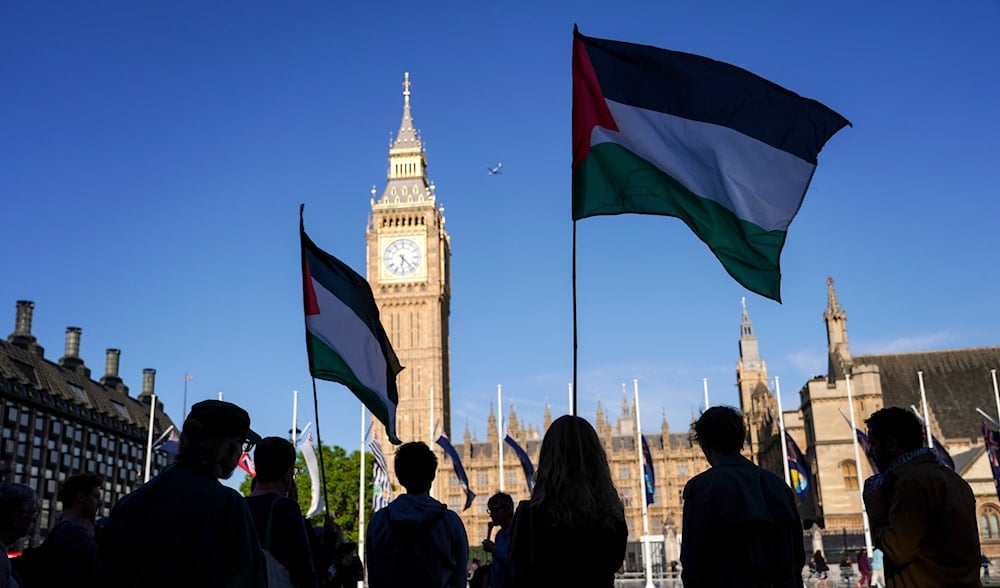Almost half of UK supports recognition of Palestine, poll reveals
A new Survation poll shows nearly half of Britons support recognizing Palestine as a state, as pressure mounts on Keir Starmer amid international moves and the worsening situation in Gaza.
-

Demonstrators hold flags outside the Parliament as they attend a protest in support of the Palestinian people in Gaza, in London, Wednesday, May 21, 2025 (AP)
A new poll conducted by Survation reveals that nearly half of Britons support the recognition of Palestine as a state, with 49% of respondents favoring official recognition and only 13% opposing it, in a ratio of nearly three-to-one in support.
The research, commissioned by environmental entrepreneur and Labour donor Dale Vince, underscores the increasing public pressure on the UK government to take a clear stance on the issue.
Prime Minister Keir Starmer is facing mounting demands to formally recognize the State of Palestine, a move aligned with the Labour Party's 2024 platform. This comes amid reports that Starmer has recalled members of his government from their summer holidays to discuss a peace plan for Gaza.
International developments are adding to the urgency. French President Emmanuel Macron recently announced plans to officially recognize Palestine this autumn, further intensifying the pressure on the UK leadership.
Even US President Donald Trump, Benjamin Netanyahu's closest ally, signaled that he would not object if the UK followed Macron’s lead, a notable shift in rhetoric from traditional and consistent US opposition to such recognition.
Despite the momentum, Starmer has so far resisted making a definitive move. Government ministers have indicated that recognition is a matter of “when, not if,” yet they have declined to provide a specific timeline.
British public opinion on 'Israel's' actions in Gaza
The Survation poll also found growing concern among the British public over "Israel's" conduct in Gaza. A majority, 54%, believe that "Israel" has overstepped acceptable boundaries in its actions, while only 5% disagreed.
In addition, 49% of respondents said the UK government should adopt a more critical stance toward "Israel", compared to just 10% who believed the opposite.
Furthermore, 38% expressed opposition to "Israel's" intervention in Gaza, with only 11% supporting it. Notably, 52% believe that "Israel" has violated international law in its campaign on Gaza, while 19% disagreed.
Dale Vince, the businessman who commissioned the poll, highlighted the strength of public sentiment. “The British people have spoken. They want recognition for Palestine and trade sanctions against Israel,” he stated.
The findings add to growing domestic and international calls for the UK to act decisively in response to developments in Gaza and to align its policy with evolving global sentiment on Palestinian statehood.
Trump, Starmer discuss Gaza ceasefire, UK recognition of Palestine
Trump and Starmer met Monday at Trump’s Turnberry golf resort in Scotland, with Gaza, Ukraine, and transatlantic trade topping the agenda. In remarks to reporters before their closed-door talks, Trump said a ceasefire in Gaza was “possible” and vowed to shorten his 50-day ultimatum to Russian President Vladimir Putin to end the war in Ukraine.
The meeting came amid growing international concern over starvation in the besieged Gaza Strip, as well as political pressure on Starmer to follow France’s lead in recognizing a Palestinian state.
On Gaza, Trump emphasized the need for humanitarian relief before any political solution. “It’s necessary to focus on a humanitarian basis before doing anything else. The kids need to be fed,” he said, rejecting claims by Israeli Prime Minister Benjamin Netanyahu that there is no hunger in the territory. “Based on television, I would say not particularly, because those children look very hungry.”
A spokesperson for Starmer confirmed the prime minister would propose a UK-led peace initiative for Gaza during the meeting, which aims to deliver immediate humanitarian aid and chart a path toward a two-state solution. The spokesperson said Starmer would continue consultations with his cabinet and international partners, including Arab states, “in the coming days.”

 4 Min Read
4 Min Read










